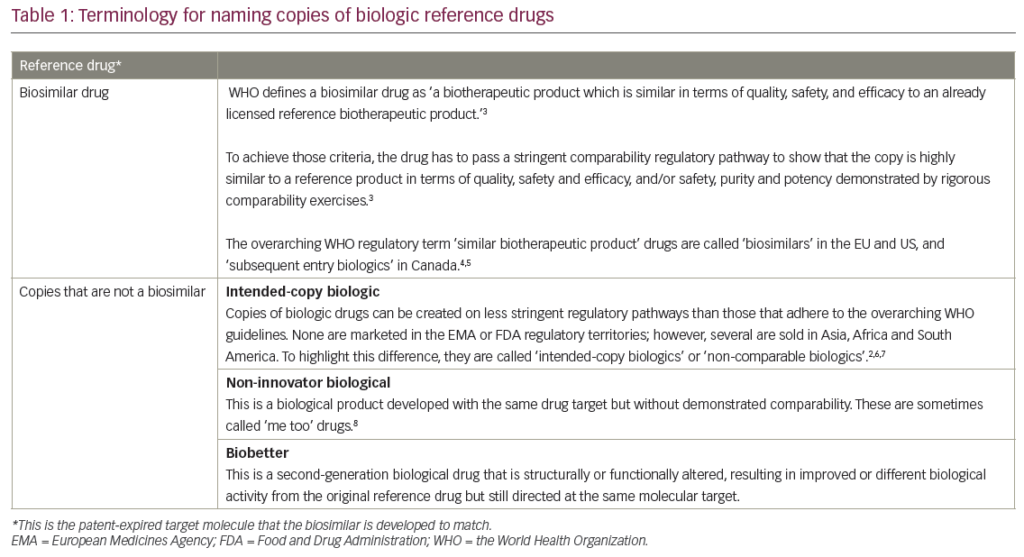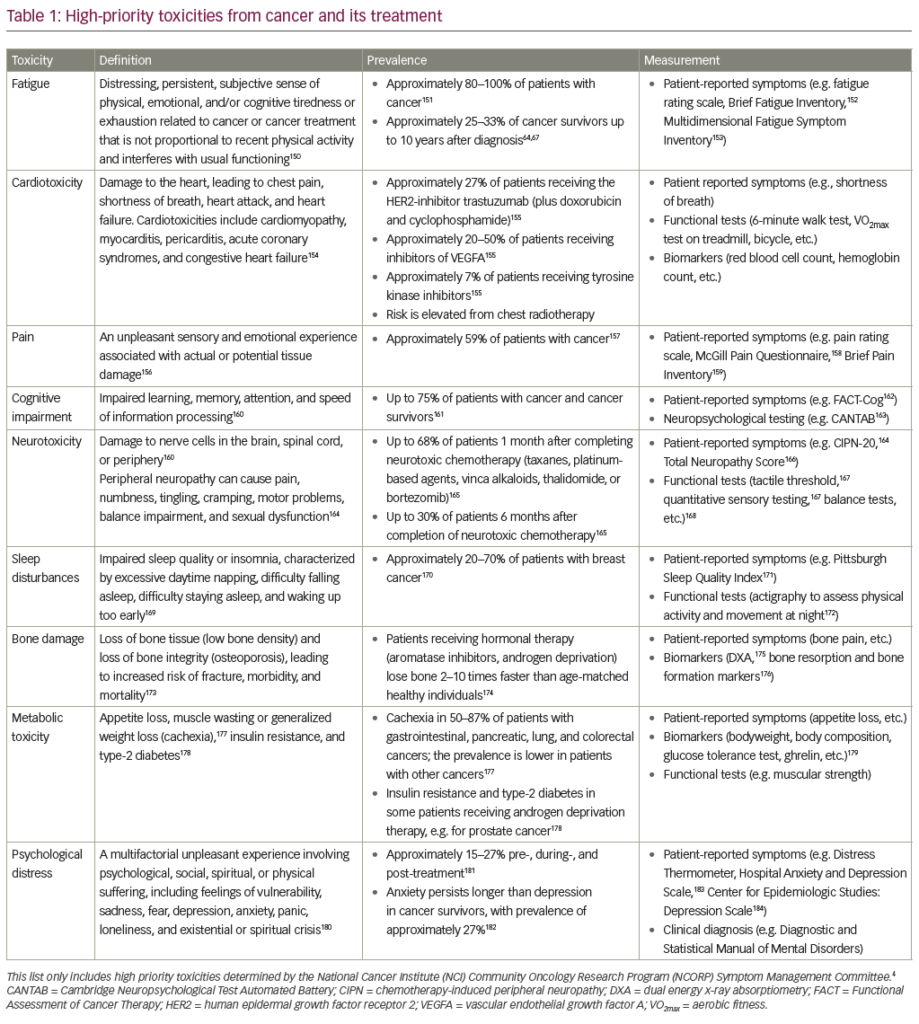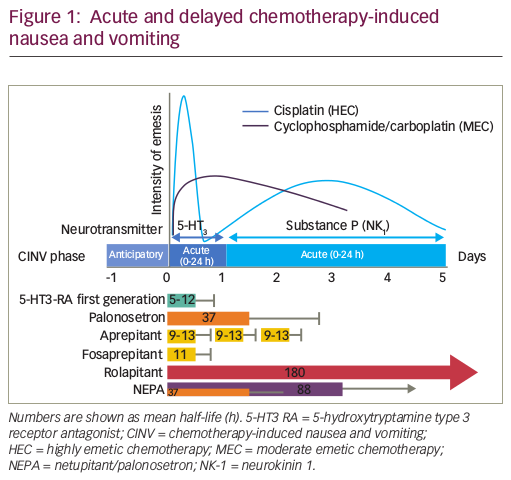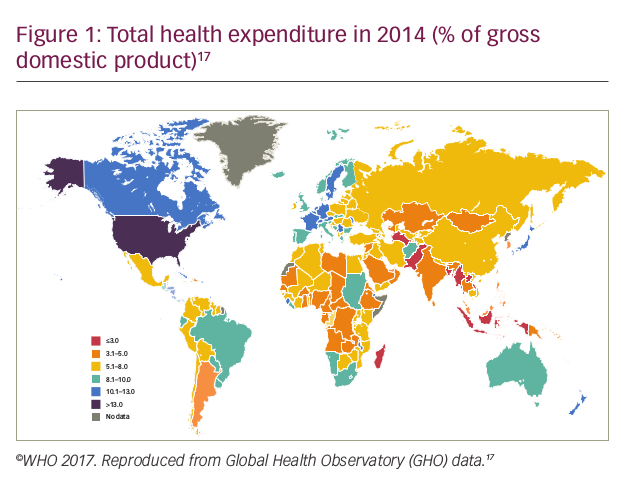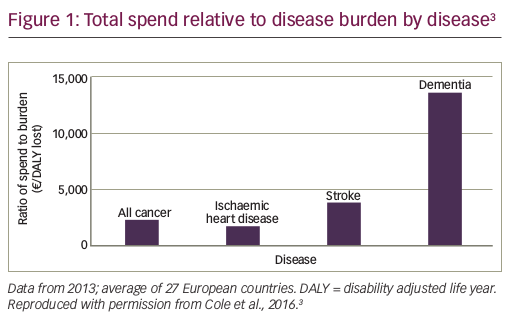Over the past few decades, survival rates of cancer patients have increased impressively through the introduction of screening, new drugs and more personalised multi-modality treatments. This success in treating cancer has resulted in a large and rapidly increasing number of cancer survivors. Currently, there are over 13 million cancer survivors in the United States and close to 30 million survivors worldwide.1,2 Some five million are survivors of breast cancer and there are also over three million survivors each of prostate and colorectal cancers. Survivors of these types of cancer are the most numerous, and women make up a slight majority of the cancer survivors (approximately 53 %). In the United States and Europe the overall five-year relative survival rate for all cancers combined has increased steadily over the past few decades and reached 66.1 % for patients diagnosed from 1999–2006.3 Cure is now a reality for the majority of patients suffering from breast, colorectal and testicular cancer, Hodgkin’s disease or children’s leukemia, with survival rates reaching 90 %. Many other patients with cancer are now successfully treated, and their cancers are being considered a chronic disease.
Cancer Survivors Face a Host of Issues
Cancer patients face numerous challenges which were unforeseen in the 1970’s, when a diagnosis of cancer was seen as a death sentence. Clinical trials were focused on more aggressive treatments to increase survival. Since the 1990´s, and beginning mainly in paediatric oncology, cancer survivorship issues have become clearer, and new trials trying to reduce treatment toxicity have been introduced. Long-term toxicity data, however, are still scarce. Many patients have now become cancer survivors and may face secondary problems for which neither standard oncology follow-up care nor society as a whole are well prepared. Some encounter second malignancies, severe cardiovascular or other morbidities which impair normal life in an important way. Patients are confronted with difficulties such as societal discrimination due to slower performance, chronic fatigue or partial inability, sterility, acceptance for work, education, insurance or credit history.
The increasing number of reports on morbidity and mortality due to the physical and mental impact of cancer treatment raises questions concerning the classical follow-up of cancer patients by cancer specialists.Following the example of pediatric oncology, preventive care plans are under development for adult cancer survivors to reduce morbidity and early mortality due to late effects. However, many questions regarding risk assessment and potential interventions remain open.
In view of the rapidly growing number of cancer survivors, the definition of cancer treatment follow-up urgently needs to be considered anew, and the restructuring discussed not just among cancer specialists, psychologists, social workers, but also with epidemiologists, general practitioners, policy makers and health insurers for correct guidance of cancer survivors in the future.
EORTC Survivorship Task Force
The EORTC (European Organisation for Research and Treatment of Cancer) is a pioneer in modern cancer care, has created a Europe-wide collaboration, and is responsible for the development of a large number of modern cancer treatment strategies. Since it’s founding in 1962, the EORTC has contributed to improved outcome, quality of life (QoL) and treatment of cancer patients, and today the EORTC remains a pioneer in cancer clinical research leading to the development of optimal cancer care. The existing EORTC network and knowledge, together with its large database of clinical studies performed over these five decades, is of tremendous value in increasing the knowledge of the situation and needs of cancer survivors. The EORTC would like to not only contribute by collecting detailed information on late morbidity and mortality, but also by creating the possibility to improve data-collection, statistical modeling, and international cooperation in the future. The EORTC can facilitate discussion of preventive care plans and follow-up guide lines of cancer patients in Europe. In order to address the needs of cancersurvivors, high quality research of late treatment effects is needed, and this requires access to large clinical cohorts of uniformly treatedcancer patients who have been prospectively followed for many years.
The EORTC Survivorship Task Force aims to evaluate the aforementioned problems in cancer survivors who have been treated within clinical trials conducted by the various EORTC research groups. The mission of EORTC Survivorship Task Force is to identify the needs of cancer survivors and provide guidance for their proper management.
First, though, we should define what is meant by a cancer survivor, because there is some variability in the definitions. For example, the United States National Cancer Institute (NCI) defines a cancer survivor as any person with cancer, starting from the moment of diagnosis.4 For its estimates on cancer prevalence, the International Agency for Research on Cancer (IARC) categorises according to three different phases of cancer care: initial treatment (within one year), clinical follow-up (two to three years) and cure (four to five years).2
The EORTC Survivorship Task Force will use the term survivorship to describe patients who have completed their primary treatment (maintenance treatment can be on-going). The initial focus of this initiative will be on adult cancer, and primarily lymphoma, breast, colorectal, prostate gynaecological and testicular cancers. Patients who are not cured but are in remission for extended periods of time can be included in the definition, seeing the broad emphasis on QoL and treatment related morbidity in this category of chronic patients.
In the EORTC’s more than five decades of international, multidisciplinary large clinical trial experiences, many data on common (breast, colon), but also rare (Hodgkin´s lymphoma, testicular cancer) have been collected. By joining data, facilitating cooperation between different working parties and expanding clinical data to retrospective but also prospective surveys on late effects, the EORTC can play a major role in cancer survivorship research and care-development. With the Survivorship Task Force initiative, the EORTC expands its mission from better cancer treatment and outcome in terms of progression-free survival to late morbidity and mortality and help survivors meet chronic health, reproductive, social, and employment problems in the future.
Using EORTC clinical research data, we hope to estimate the magnitude of cancer survivors’ problems, individual risk factors, and susceptibility. Possible preventive measures and guidelines for proper management are an important goal. Two main research strategies are being initiated in parallel. First, retrospective collection and analyses of cancer survivor data are developed in a variety of projects, for which several types of retrospective analyses of the EORTC database across study groups are being performed. Special updates with medical, socio-economic and QoL questionnaires are being developed and validated in collaboration with the EORTC QoL Department. Secondly, prospective long term follow-up in clinical trials are being adopted to allow systematic and comprehensive collection of data related late side effects; translational research on materials will be retrospectively retrieved or prospectively collected to identify risk group and individual susceptibility.
Progress Beyond the State-of-the-art
The existing literature demonstrates that radiotherapy and chemotherapy may result in serious late adverse effects; in particular, these are associated with increased risks of second cancer and cardiovascular disease. The literature is focused on treatments dating from the 1960–80’s, and many of these treatments are now obsolete. Little is known about combination of treatments, modern radiotherapy techniques, targeted agents, and hormonal treatments. Few studies have obtained data directly from patients and/or have considered preexisting co-morbidity, life-style, and obesity of cancer survivors. There are few guidelines for the management of adult cancer survivors, and little is known about management and barriers in health care within different European countries.
The strategic plan of the EORTC Survivorship Project includes:
- Provide more insight into late adverse effects of modern cancer treatments by stimulation and central coordination of diverse research efforts in retrospective analysis of long-term survivors treated in EORTC conducted clinical randomised trials across different tumor-orientated groups.
- D evelop data-collection directly from the patients in various European countries using the EORTC network which would enable surveys on topics such as fatigue, cognitive and reproductive function, and other socio-economic and QoL questions. Integration of prospectively planned long-term follow-up into clinical trials and inclusion of self-reporting tools will be proposed to improve comprehensive collection of data.
- D evelopment of cancer survivorship QoL core-questionnaires addressing medical, socio-economic, and QoL issues in collaboration with the EORTC QoL Group so that survivors can be asked directly about their experiences.
- D escription of patterns of mortality and morbidity after treatment for lymphoma, early breast, colorectal, testicular, and prostate cancers in EORTC randomised trials.
- C onduct case control studies and analyse how late mortality and morbidity are related to the dose and planning of different chemotherapy agents, targeted therapy, hormonal treatment, and the radiotherapy used, by combining documented treatment data to follow-up surveys of late effects such as cardiovascular disease, lung fibrosis, infertility, secondary cancers, cognitive dysfunction, and other neurological complications.
- D evelop prediction scores for risk of different physical and mental late adverse events regarding age, sex, country, pre-existing co-morbidity, and life-style factors.
- C ollate information on the current management of European cancer survivors and provide insight into barriers to good health care. Improve communication among different academic, national and international working groups performing research regarding survivor’s issues and join forces by sharing data to complete registries and series of long-term data in different countries.
- C reate awareness and guidelines for post-cancer care. In order to identify barriers, interaction is needed with primary health care professionals, patient advocates and also insurance/banking representatives, health care politicians, and economists. Later, following definition of the problems, follow-up of risk profiling, and preventive care programs can be improved and addressed in terms of cost-effectiveness.
- Translational research on materials retrospectively retrieved or prospectively collected so as to identify risk groups and individual susceptibility for development of secondary tumors.
- D evelop an open access website for data-collection, patient information on prevention and health promotion, expert opinions, shared publications, and harmonised guidelines. Sponsoring can be communicated and shared on the web-based platform, and the results of projects can be presented.
- Through workshops and meetings, the EORTC Survivorship Task Force can convene leading experts and share knowledge with a broader medical community which could also include health care economists, policy makers and patient associations.
- By being an international initiative, collaboration can take advantage of different national strengths and combine them to compare morbidity, care plans, and preventive strategies to produce high quality and unique research which are difficult to accomplish in other parts of the world seen due to a lack of follow-up or treatment accessibility.
Structure of the EORTC Survivorship Task Force
The EORTC Survivorship Task Force comprises members of a number of EORTC research groups. The EORTC Survivorship Task Force steering committee is responsible for evaluating submitted proposals and for establishing collaborative projects across the EORTC groups. Initial funding was offered to create the platform by the Lady Snowman Foundation. While structuring the different projects, funding and cooperation with patient associations, data providers, and European scientific research promotion programs are needed.
1st EORTC Cancer Survivorship Summit
The 1st EORTC Cancer Survivorship Summit (30–31 January 2014, in Brussels) will be organised by the EORTC Board to bring together experts in the field of late adverse effects research and cancer survivors for closed table discussions on priorities for future research, guideline development, and international networking. The six topics for discussion include second malignancy, cardiovascular effects, fertility/sexuality, cognition, psychological and social impact, and work/financial impact and fatigue. In an open part of the 1st EORTC Cancer Survivorship Summit, the state of the art and, importantly, future research directions will be shared with patient advocates, representatives of insurance companies, policy makers and the rest of the audience in key-note lectures, as well as in panel and round table discussions. By organising this event, the EORTC hopes to raise awareness of cancer survivorship issues, stress the importance of medical, political and financial follow-up of cancer survivors, and move future research forward in this growing area of modern cancer care.
Speakers at the summit will outline the European Union policy to fight cancer, give insight into the patients’ perspective, document the need for international collaboration, provide an economic perspective, and lay out the EORTC strategy for cancer survivorship research. Specific sessions will address a host of cancer survivorship topics. One session will focus on late effects such as second malignancies, issues concerning fertility and sexuality, as well as cardiovascular complications. A session will also be organised around interventions plans such as survivorship care plans and behavioral and life-style interventions plans. In a session focusing on life beyond cancer, the topics of fatigue, psychological and social consequences, and work and financial consequences will be addressed. Research issues need to be discussed, and topics such as cognition, assessment of QoL and optimal methods for data collection, and innovative IT tools will be among those discussed. Finally, a session will deal with organising survivorship research in Europe. Here, the perspectives of the European Union and of patients will be heard, and also a global perspective in terms of cooperation between regions will be on the agenda. More information about the 1st EORTC Survivorship Summit can be found at www.eortc.org/survivorship2014 .
Setting the Stage for Discussing Cancer Survivorship Issues
The EORTC wants to stress the importance of survivorship issues and play an active role in future research and guideline development. By uniting experts in the field and, moreover, facilitating their interaction with patients, survivors, insurers, bankers, and policy makers, future lines of research can be developed faster and be better adapted to the real life situations of cancer survivors. In this new era in which cancer is treated successfully or changed from a lethal into a curable or chronic disease, the EORTC aims to improve not only the life expectancy of patients with cancer, and, by creating the EORTC Survivorship Task Force, will combine the efforts of cancer survivorship stakeholders to address survivorship issues prospectively and systematically and guide future research and health policies in Europe for the benefit of all European citizens.
EORTC Cancer Survivorship Summit – January 2014







